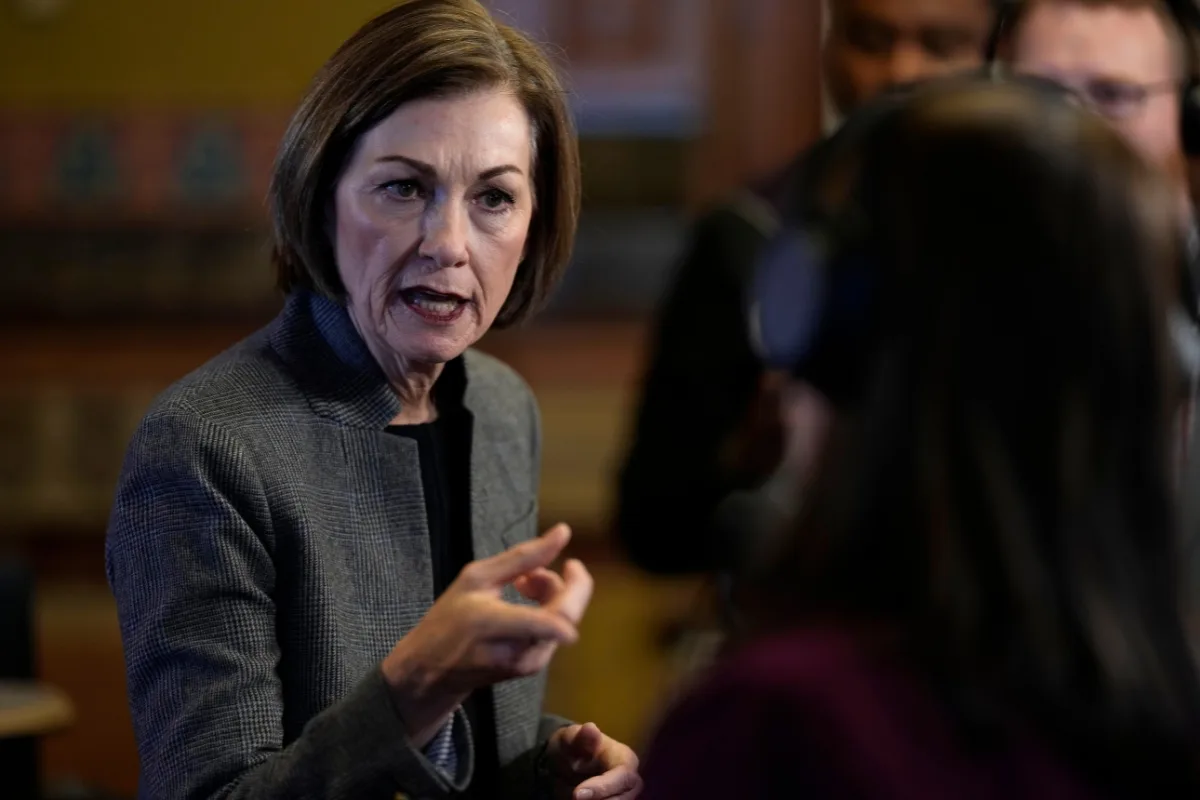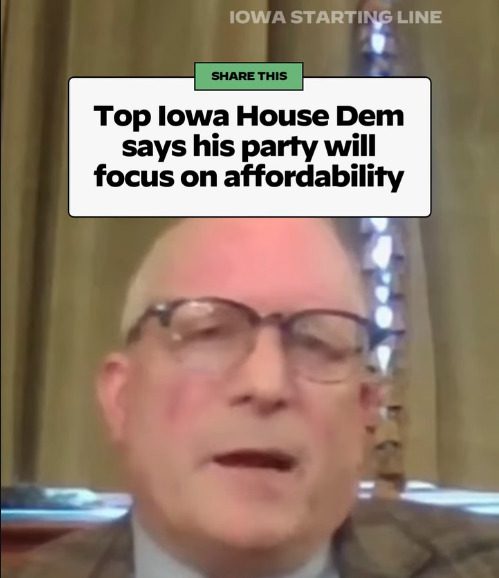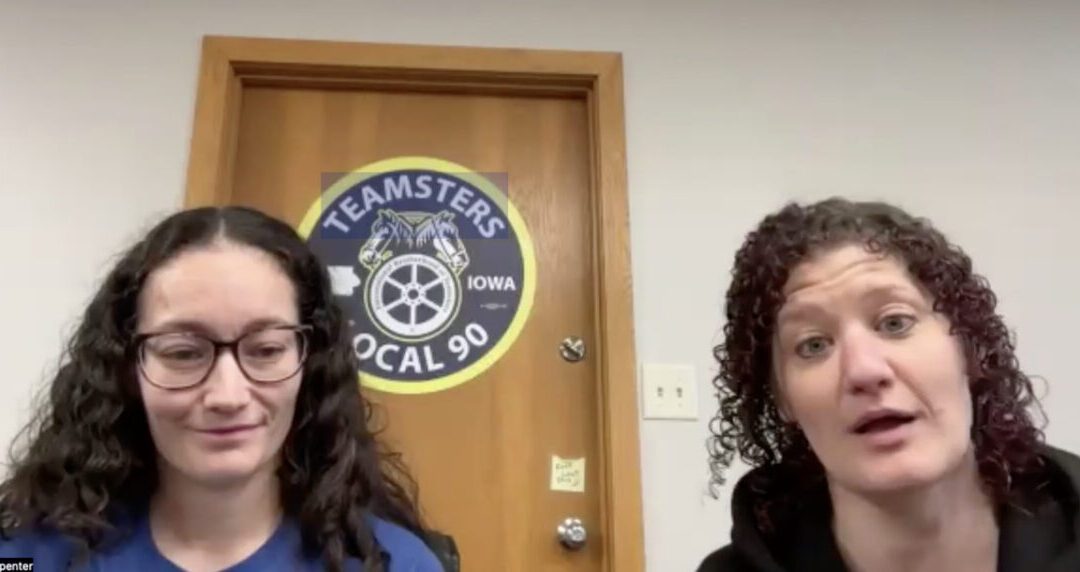
Iowa Gov. Kim Reynolds appointed a board of wealthy Iowans to recommend ways of making state government more efficient. Iowa DOGE returned one of Reynolds old ideas. Pictured, Reynolds speaks during a news conference, Wednesday, Jan. 31, 2024, at the Statehouse in Des Moines, Iowa. (AP Photo/Charlie Neibergall)
A taskforce appointed by Gov. Kim Reynolds recommended eliminating the state pension system for new employees and replacing it with a 401(k)-style plan. Iowa DOGE’s proposal has sparked fierce, bipartisan opposition.
Governor Kim Reynolds promised in 2018 she’d “protect and defend” Iowa’s public employee retirement program, IPERS. Approaching her final year as governor, her administration is reaching once again for this third rail of Iowa politics, all in the name of so-called government efficiency.
When she chartered it earlier this year, Reynolds said Iowa DOGE—a task force based on the federal DOGE headed by Elon Musk—would make recommendations to further her administration’s efforts to make government more efficient. The board has been criticized for only including Republican ex-officio members.
During a meeting last Wednesday in Des Moines, the task force met to discuss the recommendations they plan to submit to Reynolds and the Legislature by a Sept. 29 deadline. They supplied 45 recommendations, including tying teacher pay to student performance and a “red tape hotline” for reporting bureaucratic problems.
Iowa DOGE also floated a recommendation to replace IPERS for new state employees with a 401(k)-style retirement plan. The proposal would apply to newly hired employees, not current workers who’ve already been paying in.
IPERS is the state’s largest public retirement system, affecting over 414,000 public workers including teachers, police officers, and firefighters.
“Currently, the state is contributing nearly 70% to an employee’s retirement plan; where the employee is contributing only 30%. In the private sector, these percentages would almost be the opposite,” Terry Lutz of McClure Engineering Co. told the board. He called IPERS a creator of “huge liabilities for our state.”
Pensions, often called defined benefit plans, are employer-sponsored retirement plans providing a guaranteed stream of income, and therefore stability, for retirees. By comparison, defined contribution plans provide a savings account where the final payout depends on contributions. Where pension systems shift investment risk to employers, defined contribution systems, like 401(k)s shift that risk onto employees.
Lutz was among the 13 business leaders Reynolds named to the task force representing large Iowa employers like Fareway, Principal Financial Group, and Well Enterprises. These wealthy members of Reynolds’ inaugural Iowa DOGE task force said the change was aimed at reducing liability for the state.
However, even when accounting for benefits, public-sector workers make 14.5% less than their counterparts in the private sector nationwide. Pension plans like IPERS help make up that gap, allowing government jobs to compete for qualified workers.
While seen as a liability by Iowa DOGE, IPERS is among the most stable pension plans in the country. A common measure for a pension’s financial health is its funded ratio; the value of the plan’s assets divided by its liabilities. According to an Equable analysis. Iowa’s funded ratio, 91.6% in 2024, was the 11th highest in the country. When IPERS’ quarterly investment board met in December, its CEO celebrated its increased financial stability over the years.
“Because of superior management of its investment portfolio and sufficient contributions from members, IPERS is growing its funded ratio and shrinking its unfunded liability more quickly than anticipated,” IPERS CEO Greg Samorajski said.
Reynolds administration returns to IPERS
Years before Iowa DOGE was a glimmer in the governor’s eye, Iowa Republicans have explored changing how IPERS works.
In 2017, then-State Sen. Brad Zaun started the conversation with a bill to study moving newly hired Iowa public employees into a defined contribution 401(k)-style retirement system, a massive change to the benefit and the way it’s administered by the state.
On his way out the door that year, former Gov. Terry Branstad announced a study of IPERS, but neglected to establish the task force before departing to become President Donald Trump’s ambassador to China. Nevertheless, things were already moving in the Senate.
Sen. Charles Schneider, R-Des Moines, led a IPERS study committee working with the Reason Foundation, a Libertarian think tank that opposes pensions. While Schneider told the Des Moines Register that no decisions were made, Reason had published a handbook with options for replacing a pension with a 401(k) style.
“I support his (Schneider’s) efforts in doing that,” Reynolds said.
The issue became a flashpoint in her 2018 reelection campaign. On a stop in Jefferson, Reynolds called it a scare tactic by Democrats, The Green County News reported.
“They (the legislators) are not going to do anything that will impact your IPERS today, tomorrow, or into the future. It is not going to happen,” Reynolds said.

The front and back of a campaign mailer, the Republican Party of Iowa sent out ahead of Reynolds’ 2018 election.
Many Iowans received mailers echoing this suddenly full-throated support for a program that one in 10 Iowans have stake in.
Now, Reynolds’ hand-picked task force appears to be recommending she go back on that promise.
Labor unions, legislators come out against IPERS changes
Iowa DOGE’s proposal was met with severe opposition from groups who represent the affected employees. In a statement, ISEA President Joshua Brown said Lutz and the rest of the board was “out-of-touch.”
“Their recommendation to ‘save’ taxpayer money on the backs of public employees is not just an outrageous and unimaginative attempt to distract from future revenue challenges, but also a deeply concerning one,” Brown said. “It has the potential to harm every community in Iowa. IPERS is not broken; rather, it is a model across the country, and their idea is a solution in search of a problem.”
In a social media post, the Iowa Federation of Labor AFL-CIO said, “If Governor Kim Reynolds was actually sincere about making government work better, she’d assemble a task force of public employees, not business executives or pay-to-play donors for advice. Hands off IPERS.”
Democrats joined in the pile on Iowa DOGE’s recommendation, with party Chair Rita Hart saying: “Iowa’s public employees keep our streets safe, our children educated and our communities vibrant. They deserve a strong pension system like the one they currently have.”
Rob Sand, a Democrat running for governor in 2026, said weakening IPERS only stops people from taking public service jobs, leaving the public worse off.
“Police officers, firefighters, teachers, plow drivers, and more paid into IPERS and should be thanked for their service. They take salaries lower than typical private sector salaries, some because of the promise of IPERS,” Sand said. “This proposal could result in reductions of retirement benefits that these workers have already paid into for years.”
Some Iowa Republicans also oppose the recommendation. State Reps. Ray Sorensen of Greenfield, Ann Meyers of Fort Dodge, and Jason Gearhart of Strawberry Point all made posts to social media saying they’d heard from constituents and didn’t support the recommendation.
State Rep. Brian Lohse of Bondurant told Iowa Starting Line he doesn’t believe there’s support within the Iowa House for changing IPERS in the 2026 Iowa Legislative Session. He said Iowa Republicans already made a number of changes to state government—reduced cabinet level entities, boards, and commissions—and many of those reductions needed to “marinate” for longer before more changes are made.
“We shouldn’t shy away from conversations about what’s a better outcome, but if we start down that road, it’s going to have to be with some extremely knowledgeable experts about how any changes affect our current beneficiaries,” Lohse said. “Right now, IPERS is run so well and everyone has gotten used to it. It’s hard to envision a change that would be beneficial.”
Members of the Iowa DOGE Task Force:
- Emily Schmitt (Task Force Chair), Sukup Manufacturing Co.
- Nick Bowdish, Elite Octane
- Brianne Schulte, Vermeer
- Adam Keune, University of Iowa Pappajohn Entrepreneurial Center
- Craig Dozark, Crawford County Board of Supervisors
- Terry Lutz, McClure Engineering
- Beth Tinsman, Twin State Technical Services
- Kathy Kay, Principal Financial Group
- Ryan Schaap, Well Enterprises
- David Spalding, Iowa State University College of Business
- Reynolds Cramer, Fareway
- Joe Murphy, Iowa Business Council
- Mark Campbell, Former Webster County Supervisor
- Hans Wilz (ex-Officio Member), Iowa House of Representatives
- Dan Dawson (ex-Officio Member), Iowa Senate
Support Our Cause
Thank you for taking the time to read our work. Before you go, we hope you'll consider supporting our values-driven journalism, which has always strived to make clear what's really at stake for Iowans and our future.
Since day one, our goal here at Iowa Starting Line has always been to empower people across the state with fact-based news and information. We believe that when people are armed with knowledge about what's happening in their local, state, and federal governments—including who is working on their behalf and who is actively trying to block efforts aimed at improving the daily lives of Iowan families—they will be inspired to become civically engaged.


Big layoffs=bad press? Welcome to ‘forever layoffs’
It's the big, sudden layoffs or closings that really get our attention—when hundreds are let go at John Deere plants across the state, or Tyson...

Affordability will be focus for Iowa Dems this year: Iowa Worker’s Almanac news and layoffs
Working class news you can use: 'Affordability' key for Iowa Dems: Iowa House Democrats say they will focus on affordability in the upcoming...

Iowa City Starbucks strikers shut down their store; here’s why
The high temperature was just 18 degrees and breezy in Iowa City on Dec. 19. But Abigail Scheppmann and a coworker were standing outside the closed...

UnityPoint nurses likely win union vote: Iowa Worker’s Almanac
Iowa Worker's Almanac news and layoffs for Dec. 18, 2025: UnityPoint nurses likely win union: With a vote of 871-666, despite 251 ballots being...

Des Moines Allegiant pilot warns a strike could be coming
"Allegiant needs to invest in their people and their pilots." So says Tyler Heavey, a captain with Allegiant Airlines for the last six years. He...

Starbucks strike comes to Iowa: How you can help
"The pressure keeps rising." That's what Jacob Scroggins told me recently. (If you don't remember him from my earlier article on it, he's a shift...





